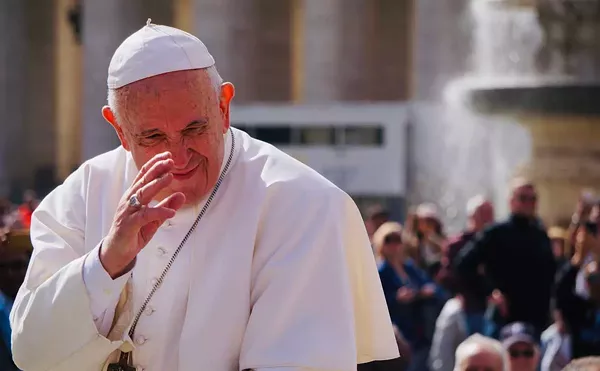
Audio By Carbonatix
[
{
"name": "GPT - Leaderboard - Inline - Content",
"component": "35519556",
"insertPoint": "5th",
"startingPoint": "3",
"requiredCountToDisplay": "3",
"maxInsertions": 100,
"adList": [
{
"adPreset": "LeaderboardInline"
}
]
}
]
Takeshi “Beat” Kitano has a strikingly negative screen presence. Impassive to the point of seeming almost comatose, a disconcerting tic around his eye the only thing signaling that there’s somebody in there, he’s the calm center of a chaotic, violent universe. His physical economy is matched by a terse vocal style; in action he’s swift and indomitable, at rest he’s like a walking version of one of those T-shirts that read: “Don’t shoot me, I’m already dead.” It’s the only character he does these days, and it can be very hard on an audience groping for some connection with a story’s ostensible hero. It’s difficult to get a handle on someone who makes Clint Eastwood seem manic.
In his latest writer-director-star vehicle, Kitano brings the character, here called Yamamoto, to Los Angeles and its world of street gangs and mob ruthlessness. Yamamoto is a Yakuza (roughly the Japanese equivalent of the Mafia) in search of his half-brother Ken (Claude Maki), a street-level drug dealer whose punkish cohorts include Denny (Omar Epps). The scene would seem to be set for some kind of comedy-drama about clashing gangster cultures. And while there is some element of that as LA baddies are awed by Yamamoto’s obliterating black hole of toughness, things play out with Kitano’s peculiar blend of deadpan nihilism. Yamamoto has no desire to disengage his half-brother from his dangerous pursuits; rather he wants him to up the ante and drags him into an unwinnable war with the local mob. Having scoped the scene, Yamamoto sees that things are ripe for some pointless violence; or maybe there’s some obscure Bushido code subclause oiling his motivation. In any case, he’s not talking.
At some point during the ensuing slaughter, punctuated by shaggy-dog episodes of male bonding, Yamamoto and Denny forge a kind of stoic friendship which leads to a rather corny climax of sacrifice and posthumous largesse.
But story has never been Kitano’s strong point. What makes Brother a respectable entry in the director’s canon is its trademark blend of disparate moods, with humor rubbing up against bloody murder and satire up against pure action. Less meditative than the director’s Fireworks (1998), the film more closely resembles his Sonatine (1994), where violence becomes a sort of Sadean slapstick and hardened killers have to fill up their empty time with games.
Kitano’s films only work on their own terms — judged by the standards of any conventional genre, they seem not to work — and even though these terms are becoming a little too familiar, Brother still has that disconcerting mix of bemusement, humanity and extraordinary hostility that informs his best work.
Showing exclusively at the Main Art Theatre (118 N. Main, Royal Oak). Call 248-542-0180.
Richard C. Walls writes about the arts for the Metro Times. E-mail him at letters@metrotimes.com.





